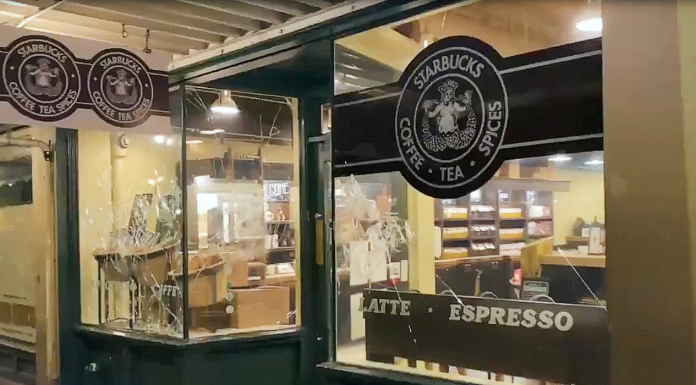Starbucks CEO Kevin Johnson refused to reveal during the company’s annual shareholder meeting how much money it had lost due to ongoing riots led by Antifa and Black Lives Matter in cities such as Portland and Seattle.
Davis Soderberg, an associate with the National Center for Public Policy Research‘s Free Enterprise Project, attended Starbucks’ virtual meeting and submitted a question about the company’s riot-related losses.
However, Johnson ignored the question entirely.
“In the wake of the violent Black Lives Matter protests over the past year, I’ve found it increasingly odd that Starbucks gives large amounts of money to organizations that have contributed to the rioting and looting, including vandalism of Starbucks locations,” Soderberg said.
“With a quick Google search, shareholders can find videos of Starbucks shops being destroyed by ‘protesters,'” he added.
To oppose the installation of President Joe Biden, far-left, anti-government extremists wearing all black smashed the windows of Starbucks’s first-ever storefront location in Seattle’s Pike Place Market, Fox Business reported.
The vandalism continues. On March 13, Seattle police arrested 13 people after a group of Black Lives Matter protesters smashed windows and vandalized a Starbucks, according to KOMO.
Despite this destruction, the Starbucks Foundation has donated $1 million to employee-nominated organizations that are “promoting racial equity and more inclusive and just communities,” Today reported.
Last summer, as Starbucks stores in Seattle and Portland boarded their windows and braced for far-left riots, the company also reversed a ban that prevented baristas and employees from wearing shirts that promote Black Lives Matter, Vogue reported.
Starbucks acquiesced in a statement: “We see you. We hear you. Black Lives Matter. That is a fact and will never change. Wear your BLM pin or t-shirt. We are so proud of your passionate support of our common humanity.”
Then Starbucks went beyond passive resistance and actively joined the rioters and vandals by launching its own Black Lives Matter t-shirt, Fast Company reported.
Scott Shepard, deputy director of the Free Enterprise Project, said in a press release that investors should be wary of a corporation that cooperates with violent groups.
“Johnson’s failure to address our question is hardly a surprise, but his silence carries dark portents for shareholders, indicating anew that the company has placed politics far above good business practices,” Shepard said. “Careful investors must wonder if Starbucks remains a responsible business that can be trusted with their assets.”
Shepard said the company’s donations not only fund groups “that actively participate in the protesting and rioting that has cost Starbucks so much” but also that seek to destroy the “economic and social structures that are required for economic growth and social harmony—and thus for Starbucks’ success.”
Representatives with the Free Enterprise Project submitted a shareholder proposal to prevent Starbucks from supporting organizations that threaten its existence, but the Securities and Exchange Commission blocked the proposal upon appeal from Starbucks.
“[I]n response to FEP’s effort to place a question about Starbucks’ charitable giving on the ballot for this meeting, the company fought tooth and nail, even asserting to the Securities & Exchange Commission that shareholders like us, who dare to espouse policy positions different than the company’s, should be barred from submitting any shareholder proposals at all,” Shepard said.

